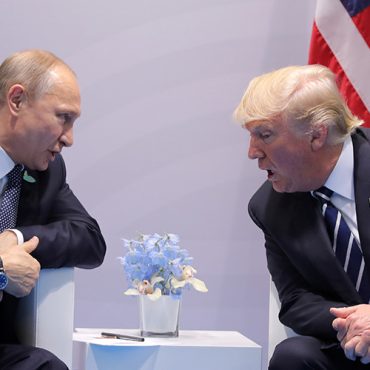This is a rush transcript. Copy may not be in its final form.
AMY GOODMAN: This is Democracy Now! I’m Amy Goodman, with Juan González.
We spend the rest of the hour with Jane McAlevey, the great labor organizer, scholar and writer, whose influence was felt when Volkswagen employees at the Chattanooga, Tennessee, factory overwhelmingly voted last week to join the United Auto Workers union. The plant will become the first foreign-owned car factory in the South to unionize. The decisive victory comes in the wake of the historic strike and contract gains with the U.S. auto industry’s “Big 3” companies last year. The UAW has pledged to unionize auto workers across the country. On Sunday, UAW President Shawn Fain spoke at a conference organized by Labor Notes.
SHAWN FAIN: Four thousand workers in Chattanooga, Tennessee, did what many people said was impossible. … You know, we did what the pundits said couldn’t be done. Every time I was interviewed by people and we talked about organizing the South, they would always do an eye roll and say, “Do you really think you can win in the South?” And you know what? Those workers stood up for themselves. That’s how we won. And they voted for a union.
AMY GOODMAN: The UAW is now bracing for its next fight, a union vote at in Vance, Alabama, at one of Mercedes’s two nonunion U.S. plants — the company’s only nonunion plants worldwide.
This comes as Supreme Court justices are hearing oral arguments in a case filed by Starbucks against the National Labor Relations Board, the NLRB, which could make it harder to address corporate interference in union drives.
For more, we turn to Jane McAlevey. She’s been an organizer in the labor movement for more than 20 years, the author of four books, including Rules to Win By: Power & Participation in Union Negotiations, written with Abby Lawlor. She’s also the author of A Collective Bargain: Unions, Organizing, and the Fight for Democracy, as well as other books.
It’s great to have you with us, Jane. We’re going to talk about two issues: your remarkable — you as a role model and strategist in the union movement, and also taking on your own struggle right now. But I want to start with Chattanooga and the significance of the UAW victory.
JANE McALEVEY: Yeah, because it’s such a great story. I mean, you had 4,300 auto workers in Chattanooga, Tennessee, on their third try — honestly, they should have had a union there 10 years ago, six years ago. But this win wasn’t just a win — it was what we would call a beatdown, honestly. I mean, they beat the employer by 72%. The numbers are astounding.
So, part of what was so great about it is they showed in Chattanooga a lot of what I have been talking and writing and practicing about for decades, which is they had a supermajority strategy. They said they wouldn’t file for election until they had what we call a supermajority of the workers engaged on public petitions, saying, “We’re ready to vote ‘yes.’” And when you lead with a public petition that says, “We’re ready to vote ‘yes,’” you are signaling to the employer, “We’re coming to get you.” And that’s exactly what they did. They were having parties. They were having T-shirt parties. They were walking around in red T-shirts in that plant for weeks leading up to the election. They were messaging all the things that those of us who win really hard campaigns — and I don’t know any campaign anymore that isn’t hard — it’s all the stuff that we do, those of us who have just kept winning in the last 40 years, while too many national labor leaders sat around debating, “We can’t really win. We have to change labor law. We have to do all these things,” when all we have to do is actually start trusting that workers are really intelligent, that if we teach them what it takes to win, which is building supermajority organization before the election, that’s going to carry them into a great first contract fight. And that’s just what they did in Chattanooga. And I hope they’re going to march right into Alabama and do the same, because that’s going to really rock the house of the South of this country, if we walk this into the Mercedes plant on May 17th.
JUAN GONZÁLEZ: Yes, and I wanted to ask you about that, Jane, the Alabama struggle, and also this whole issue of unionizing these foreign car companies, that have moved, increasingly established plants here in the United States —
JANE McALEVEY: Yeah.
JUAN GONZÁLEZ: — and especially in the South.
JANE McALEVEY: Juan, by the way, good to see you; Amy, as well.
Yeah, I mean, this was — look, Volkswagen didn’t have a single auto plant in the world that didn’t have a union. So, the idea that, like, the United States South is such a right-wing bastion of anti-trade unionism, that the one place in the world where workers didn’t have a union was the United States South, tells you a lot about how broken U.S. labor law is. The Economic Policy Institute, EPI, said recently, from some recent polling, 60 million — 60 million — American workers would have a union tomorrow if they were allowed to vote free and fair.
And what we’re seeing at Mercedes is different than Chattanooga. In Chattanooga, there was an agreement with IG Metall, with the German union, that helped — it didn’t totally mitigate what the employer was doing in Chattanooga, but it helped calm down the kind of vicious tactical warfare that we’re starting to see already in the Mercedes plant, where they have posters up that say things like “The UAW endorsed Joe Biden. Is that a Southern union?” So, they’re starting to run. They have fired several people just in the last week in the Mercedes plant. So, I think once the Chattanooga numbers came in, and Mercedes looked at Volkswagen and said, “Well, this was a beatdown. This was a total, extraordinary victory in Chattanooga, Tennessee. The momentum is changing,” they decided that they were going to go all out to start trying to bust the union. So, now until May 17th, when the vote count happens, every one of us needs to be emailing, asking the UAW for anything that they can do to support those workers.
But it’s an Alabama-driven campaign. And one thing I want to say about this that’s really important, before I pause, is just the worker committee in the Mercedes plant is an incredible worker-led movement. With staff support, for sure, right? You need professional staff in this country, given the union-busting laws, to help give you advice. But that movement in the Mercedes plant, in particular, is a seriously worker-driven campaign. And I can’t wait for those workers to vote “yes.” It will be a massive change in the U.S. South.
JUAN GONZÁLEZ: And I wanted to ask you about the role of Shawn Fain here. He spoke at a Labor Notes conference. For people who are not familiar with Labor Notes, this is the organization that has been backing rank-and-file movements for decades. And to have a UAW president speak at a Labor Notes conference, in itself, is highly unusual. I’m wondering your sense of the impact of the democracy movement that occurred within the UAW and its effect on the labor movement.
JANE McALEVEY: Yeah. I mean, this is a source of personal joy, because I’m a UAW member for many years, including that I was part of the 48,000-worker strike. So, I had the pleasure of voting in the ballot initiative to get direct democracy in the United Auto Workers. And then I had the pleasure of pulling a lever for Shawn Fain, doing some fundraisers on the West Coast with a bunch of folks for him.
So, to watch him go from winning the election, contested, highly contested, basically taking over in early March, walking into what was their national negotiations, every four years their national negotiations conference, in late March, going into and leading a series of unprecedented strikes, that resulted in incredible victories, had a direct impact on the workers in Chattanooga deciding, “Hey, we want some of that, right? Like, we want to top out at 40 bucks an hour instead of the low thirties that we top out at right now in Chattanooga, Tennessee.”
So, Shawn Fain is already becoming the kind of trade union leader that we need many, many more of. And I am thrilled that he is my union president. And I’m thrilled that I got to participate in the direct democracy movement that helped put Shawn Fain in, because we are seeing what one risk-taking, strategic, smart trade union leader can do in literally less than a year. He’s created a movement in less than 12 months.
AMY GOODMAN: Jane McAlevey, your incredibly strong voice doesn’t convey it, but in addition to fighting for labor rights, you are battling terminal cancer, in the fall of 2021 diagnosed with multiple myeloma. You recently wrote a piece titled “I have stopped all work to turn to home-based hospice for the remainder of my time.” Can you talk about this struggle?
JANE McALEVEY: Yeah, sure. I mean, it’s a struggle that’s basically coming to an end. I received what’s called a high-risk form of multiple myeloma, very dangerous. It’s called the 4;14 mutation. And from day one, they said you had a handful of years to live. And I just didn’t look back. I just woke up the next day and kept organizing, because, to me, while I was absolutely paying attention to my doctors, going through chemo, going through radiation, we got to the point where we had quickly run the clock on everything available to treat me. And I was moving into clinical trials. I was doing clinical trial drugs. And at this point, my cancer is ahead of the clinical trial drugs, and there is nothing left.
So, several weeks ago, I was hospitalized for a few weeks, kind of delirious, out of it, which happens a lot in the last three years. I would quietly just be hospitalized and not know what was going on around me. They thought I would be dead a few weeks ago. I’m out again. I’m riding my bike. I’m on your show. And I’m going to fight until the last dying minute, because that’s what American workers deserve.
AMY GOODMAN: Well, you’re truly amazing. And this isn’t the end of our conversation. It is the end of the show, but we’d like to do a Part 2 with you and talk more about labor history and also, going back to your student years —
JANE McALEVEY: Yeah.
AMY GOODMAN: — taking on the anti-apartheid movement, and what that meant, as students have these encampments around the country.
JANE McALEVEY: Really familiar imagery to me from being a student activist, yeah.
AMY GOODMAN: And you have a lot to teach people. I want to thank you so much for being with us and for all that you’ve offered, not just the labor movement, but to your humanity, your organizing, your brilliance in strategizing. I thank you so much. We’re going to do Part 2 in a minute.
JANE McALEVEY: Thank you.
AMY GOODMAN: Jane McAlevey, labor organizer for 20 years. That does it for our show. To see that interview, go to democracynow.org. I’m Amy Goodman, with Juan González.











Post comments (0)